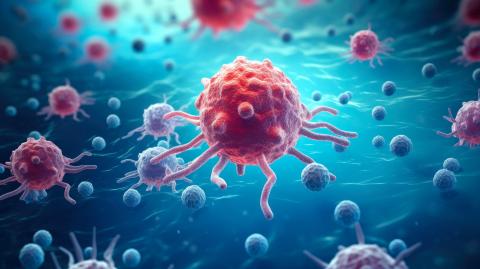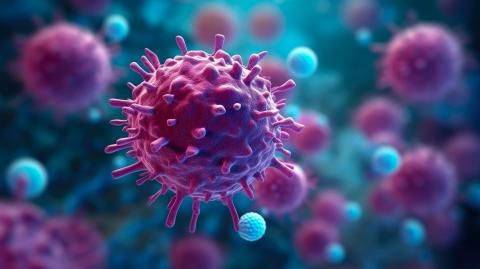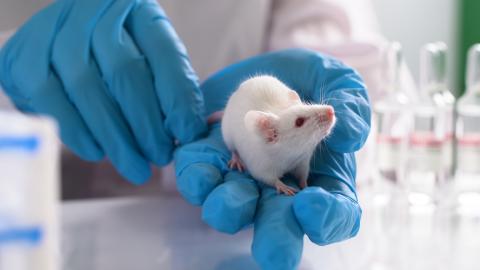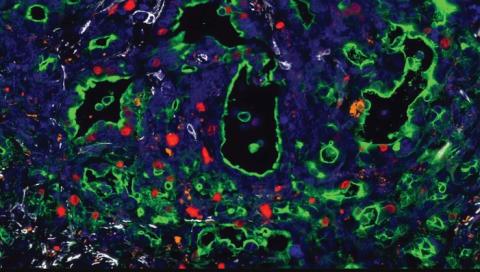Center for Applied Medical Research (CIMA)
If you are the contact person for this centre and you wish to make any changes, please contact us.
Researcher in the Gene Therapy and Regulation of Gene Expression Programme and Director of Innovation and Transfer at Cima University of Navarra
Professor of Immunology at the University of Navarra, CIMA researcher and co-director of the Department of Immunology and Immunotherapy at the Clínica Universidad de Navarra.
Senior Researcher of the Gene Therapy in Neurodegenerative Diseases Programme at the Centre for Applied Medical Research (CIMA), University of Navarra
Researcher in the Solid Tumours Programme at CIMA and the Clínica Universidad de Navarra
Researcher of the Gene Therapy and Regulation of Gene Expression Programme at Cima (Centre for Applied Medical Research) University of Navarra

A monoclonal antibody called prasinezumab reduces the worsening of motor symptoms in people with Parkinson's disease who have rapidly progressive disease, according to an analysis of a phase 2 clinical trial published in Nature Medicine. These findings suggest that clinical efficacy of prasinezumab, which works by binding to alpha-synuclein protein aggregates, is seen after one year of treatment in such patients. According to the authors, more research is needed to determine whether the antibody can be effective in people with slower disease progression after longer periods of treatment.

A phase 2 clinical trial in France has examined whether taking an oral anti-diabetic drug called lixisenatide - a GLP1 receptor analogue, similar to those also used for weight loss - also has an effect on the progression of Parkinson's disease. The results indicate that there is a modest but significant decrease in the progression of motor symptoms of the disease, although side effects were also observed. The results are published in the journal NEJM.

A multidisciplinary study involving several Spanish research groups has preclinically tested a new type of immunotherapy for multiple myeloma. Instead of modifying T cells to attack the tumour directly, as CAR-T cells do, they have managed to make them secrete bispecific antibodies, which bind to the tumour on one side and to other T cells on the other, attracting them to the tumour. According to the authors, this cell therapy was more effective than traditional CAR-Ts and could generate less resistance. The results are published in the journal Science Translational Medicine.

The US Food and Drug Administration (FDA) has issued a statement reporting that it has received reports of T-cell tumours in patients who received various CAR-T cell treatments. As quoted in the statement, "although the overall benefits of these products continue to outweigh their potential risks for their approved uses, FDA is investigating the identified risk of T cell malignancy with serious outcomes, including hospitalization and death, and is evaluating the need for regulatory action".

Research by researchers in Shanghai, China, suggests that continued practice of tai chi can slow the progression of Parkinson's disease symptoms and delay the need for increased doses of medication. The study compared 143 people who underwent tai chi training with 187 non-trainees who served as a control group. The results are published in the Journal of Neurology Neurosurgery & Psychiatry.

Parkinson's disease is usually diagnosed when there is already extensive neuronal damage and symptoms are evident. Now, researchers at Cardiff University in the UK have used movement and sleep quality data from wearable accelerometers and concluded that they can help identify the disease early, years before clinical diagnosis. Although there is no effective preventive treatment, the authors propose that the tool can determine people at risk of developing Parkinson's disease and identify participants for clinical trials of neuroprotective treatments. The results are published in the journal Nature Medicine.

A team of scientists led by the Catholic University of America in Washington has designed new artificial vectors based on viruses to improve gene therapy processes. The main novelty is that they are constructed from viruses that infect bacteria. Among other advantages, this would make it possible to avoid the possible memory of our defences against them and have a greater capacity. According to the authors, who publish their results in the journal Nature Communications, these nanoparticles "have the potential to transform gene therapies and personalised medicine".

A team of scientists led by the University Hospital Zurich (Switzerland) has tested a new treatment for glioblastoma, a highly aggressive nervous system tumour with a poor prognosis. The therapy consists of a fusion protein that combines the TNF factor - a key factor in the processes of inflammation and immune response - with an antibody that targets the tumour matrix. The researchers, whose results are published in the journal Science Translational Medicine, have studied its action together with a type of chemotherapy both in mice and in six patients included in a phase 1 clinical trial.

A phase 1 clinical trial has tested personalised mRNA vaccines against the most common type of pancreatic cancer with a particularly poor prognosis. The treatment, which is tailored to the characteristics of each patient's tumour, was given to 16 people along with surgery, chemotherapy and other immunotherapy. Half of them showed an immune response to the vaccine, which was associated with a better prognosis. The results are published in the journal Nature.

A study led by Spanish researchers and published in Science Advances has tested a new technique to improve gene therapy treatments for Parkinson's disease. Using ultrasound, they have managed to open the blood-brain barrier in specific areas, allowing the viruses used in the therapy to pass through and better reach the desired brain areas. After testing it on monkeys and three patients -patients were not given gene therapy, but the efficacy of the technique was tested using a radiotracer that does not normally cross the blood-brain barrier-, their conclusions are that the technique is safe and feasible and "could allow early and frequent interventions to treat neurodegenerative diseases".